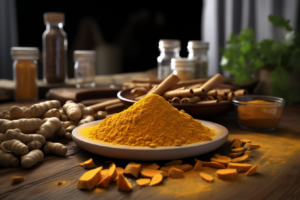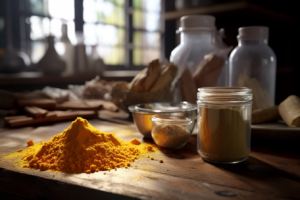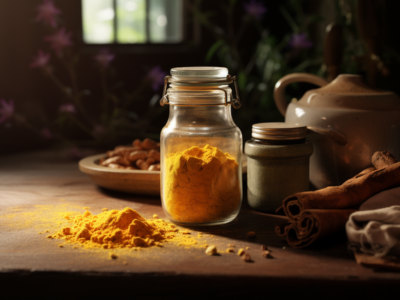Introduction to Curcumin
Curcumin is an active ingredient found in turmeric, a spice commonly used in Indian cuisine. It has been used for centuries in traditional medicine for its potential health benefits. Recent studies suggest that curcumin may help with a variety of health conditions, including arthritis, rheumatoid arthritis, and other inflammatory diseases. It has also been shown to have anti-inflammatory effects, which may help reduce pain and swelling. Additionally, curcumin may help prevent or delay the onset of certain diseases, such as cancer and Alzheimer’s.
The efficacy and safety of curcumin have been studied extensively. Studies suggest that curcumin may help reduce inflammation, improve joint health, and reduce the risk of certain diseases. However, curcumin is poorly absorbed by the body, so it is important to take a curcumin supplement with black pepper to increase its bioavailability. Additionally, high doses of curcumin may be necessary to achieve the desired health benefits. Therefore, it is important to consult with a healthcare professional before taking a curcumin supplement to ensure the right dose and form of curcumin is taken for the desired health benefits.
Health Benefits of Curcumin
Wow, the health benefits of curcumin are amazing! Curcumin is the active ingredient in turmeric, and it has been found to have a wide range of potential therapeutic effects. Studies have shown that curcumin can help treat a variety of common health conditions, including inflammation, arthritis, and even cancer. It has also been found to have potential benefits in the prevention and treatment of cardiovascular disease. In addition, curcumin has been shown to have anti-inflammatory, antioxidant, and anti-cancer properties.

The pharmacokinetics of curcumin ingestion has been studied, and it has been found that curcumin has a relatively low bioavailability. However, supplementation with curcumin or turmeric extracts and curcumin has been found to increase the absorption of curcumin.
Curcumin has also been found to enhance the efficacy of turmeric extracts for alleviating the symptoms of various diseases.
In addition, curcumin has been shown to inhibit the activity of certain enzymes, which may be beneficial for the treatment of certain conditions. Curcumin has also been found to have potential clinical value in the prevention and treatment of various diseases.
Turmeric and Curcumin
Turmeric and curcumin have been gaining a lot of attention lately due to their potential health benefits. Turmeric is a spice derived from the root of the turmeric plant, and curcumin is the active compound found in turmeric. Studies have shown that curcumin may have a variety of beneficial effects, including anti-inflammatory, antioxidant, and anti-cancer properties.
The use of curcumin as a dietary supplement has been increasing in recent years, and research has shown that it may be effective in alleviating the symptoms of various diseases. Studies have also found that curcumin has the potential to inhibit the activity of certain enzymes, which may be beneficial for the treatment of certain conditions. Additionally, evidence suggests that curcumin may be beneficial in the prevention and treatment of certain diseases, such as cancer and heart disease. Furthermore, studies have found that curcumin may improve the bioavailability of other compounds, which may increase its potential clinical value.
Curcumin May Help Delay the Onset of Arthritis
Whoa! Curcumin may help delay the onset of arthritis? That’s amazing! It’s no wonder that turmeric has been used for centuries in traditional medicine for its health benefits. Studies have shown that curcumin, the active component of turmeric, has anti-inflammatory and antioxidant effects. In fact, curcumin may be effective in reducing the effects of arthritis, as well as other chronic diseases.
Research has found that curcumin inhibits the activity of certain enzymes that are involved in the development of arthritis. Additionally, curcumin may also enhance the body’s natural ability to fight inflammation. In one study, oral curcumin administration was found to reduce the symptoms of arthritis in patients. Furthermore, extracts and curcumin for alleviating the symptoms of arthritis have been studied, and it was found that curcumin supplementation can be beneficial in reducing the severity of arthritis. With its potential of curcumin for the treatment of arthritis, it is no surprise that curcumin has been gaining attention for its potential clinical value.
Benefits of Turmeric and Curcumin
Wow, the health benefits of turmeric and curcumin are amazing! Turmeric is a spice that has been used for centuries in traditional medicine, and curcumin is the active ingredient in turmeric. Studies have shown that curcumin has a wide range of potential health benefits, including anti-inflammatory, antioxidant, and anti-cancer effects. For example, research has found that curcumin may help reduce inflammation, improve cholesterol levels, and even reduce the risk of certain types of cancer. In addition, curcumin has been shown to have a positive effect on cognitive function and may even help protect against Alzheimer’s disease.

What’s more, curcumin has been found to have a positive effect on the activity of certain enzymes, which can help improve digestion and absorption of nutrients.
Studies have also shown that curcumin may help reduce the risk of heart disease and stroke, as well as improve blood sugar levels.
Furthermore, curcumin has been found to have a positive effect on the bioavailability of certain drugs, which can help improve their effectiveness. Finally, curcumin has been shown to have a positive effect on the activity of certain enzymes, which can help improve digestion and absorption of nutrients. All in all, the potential clinical value of curcumin is undeniable!
Curcumin Supplementation
Curcumin supplementation has become increasingly popular in recent years due to its potential health benefits. Curcumin is a compound found in turmeric, and it has been studied for its effects on various conditions. Studies have shown that turmeric may help reduce inflammation, improve cognitive function, and even reduce the risk of certain diseases. Additionally, curcumin has been found to have antioxidant activity, which may help protect against oxidative stress.
The amount of curcumin in turmeric supplements varies, but most contain between 500 and 1000 mg of curcumin. The bioavailability of curcumin is relatively low, so it is important to take a supplement that contains a high amount of curcumin. Additionally, curcumin supplements may contain other compounds, such as piperine, which can increase the absorption of curcumin. Studies have also found that taking high doses of turmeric or curcumin may have therapeutic effects, but it is important to consult with a healthcare provider before taking any supplement.
Curcumin May Help Prevent Rheumatoid Arthritis
It’s no secret that curcumin has a plethora of health benefits, and one of them is its potential to help prevent rheumatoid arthritis. Studies have found that curcumin has anti-inflammatory effects, which can help reduce the activity of the disease. Whether curcumin enhances the effects of other treatments or can be used as a standalone treatment is still being studied. Curcumin extract has been found to have a positive effect on the serum levels of inflammatory markers, and its activity has been shown to be comparable to that of some anti-inflammatory drugs.
In addition, the safety and efficacy of curcumin has also been studied. Lipidated curcumin in healthy volunteers was found to be safe and well-tolerated, and curcumin with piperine was found to have a greater effect on serum levels of inflammatory markers than curcumin alone. Curcumin has also been shown to have potential therapeutic effects in the prevention of rheumatoid arthritis, with some studies showing that taking a daily dose of 1.2 g of curcumin for 10 days had a positive impact on the concentrations of curcumin in the body. Curcumin supplements contain curcuminoids found in turmeric, and evidence suggests that curcumin may offer a safe and effective way to reduce the effects of rheumatoid arthritis.

Effects of Turmeric and Curcumin on Other Health Conditions
Wow, the effects of turmeric and curcumin on other health conditions are truly amazing! Studies have found curcumin to have a wide range of therapeutic effects, from reducing inflammation to improving cognitive function. Curcumin is also being studied for its potential effects on cancer, diabetes, and cardiovascular disease. In addition, curcumin has been shown to have a positive impact on serum lipid levels, suggesting that it may be useful in the prevention and treatment of heart disease.
The activity of curcumin is thought to be due to its anti-inflammatory and antioxidant properties. Studies have also shown that oral curcumin supplementation can reduce inflammation and improve symptoms of various conditions. In addition, solid lipid curcumin has been found to be more effective than regular curcumin in terms of bioavailability and therapeutic effects. All in all, curcumin is proving to be an effective and safe therapeutic agent for a variety of health conditions.
Curcumin May Lower Inflammation
The potential effects of curcumin on inflammation have been studied extensively in recent years. Research has shown that curcumin may have a positive impact on inflammation, with evidence that curcumin can reduce inflammation in the body. Studies have also shown that curcumin treatment can reduce the effects of solid lipid curcumin on serum markers of inflammation.
In addition, curcumin has been studied for its potential therapeutic effects in the prevention and treatment of various inflammatory diseases. Studies have shown that curcumin may have a beneficial effect on inflammation, with evidence that curcumin can reduce inflammation in the body. Furthermore, curcumin has been studied as a therapeutic agent in the treatment of various inflammatory conditions, with promising results. Overall, the evidence suggests that curcumin may have a positive impact on inflammation, and may be a useful tool in the prevention and treatment of various inflammatory conditions.
Conclusion
The effect of oral curcumin on human health has been studied extensively in recent years. Curcumin has been found to have a wide range of therapeutic effects, including its potential use in the prevention and treatment of various diseases. Studies have shown that curcumin has anti-inflammatory, antioxidant, and anti-cancer properties, making it a promising therapeutic agent.

In addition, curcumin has been found to have a positive impact on cardiovascular health, diabetes, and neurological disorders. It has also been found to have a beneficial effect on the immune system, as well as on the digestive system. Furthermore, curcumin has been found to have a positive effect on the skin, as well as on the liver and kidneys.
Overall, the research on the effect of oral curcumin on human health has been promising. Curcumin has been found to have a wide range of therapeutic effects, and its potential use in the prevention and treatment of various diseases is being explored. The impact of curcumin on human health is likely to be significant, and further research is needed to fully understand its therapeutic effects.
FAQ’s:
Q1. What are the health benefits of curcumin?
A1. Curcumin has been found to have a range of health benefits, including anti-inflammatory, antioxidant, and anti-cancer effects. It has also been shown to have a positive effect on oral health, and may help to prevent certain diseases.
Q2. What is the effect of oral curcumin?
A2. Oral curcumin has been found to have anti-inflammatory, antioxidant, and anti-cancer effects. It may also help to improve oral health and may help to prevent certain diseases.
Q3. Is curcumin effective in the prevention of diseases?
A3. Studies have shown that curcumin may be effective in the prevention of certain diseases, such as cancer, heart disease, and Alzheimer’s disease.
Q4. What are the therapeutic effects of curcumin?
A4. Curcumin has been found to have anti-inflammatory, antioxidant, and anti-cancer effects. It may also help to improve oral health and may help to prevent certain diseases.
Q5. Is curcumin a therapeutic agent?
A5. Yes, curcumin has been found to have a range of therapeutic effects, including anti-inflammatory, antioxidant, and anti-cancer effects. It may also help to improve oral health and may help to prevent certain diseases.
Q6. What is the impact of curcumin?
A6. Curcumin has been found to have a range of health benefits, including anti-inflammatory, antioxidant, and anti-cancer effects. It has also been shown to have a positive effect on oral health, and may help to prevent certain diseases.
Q7. How can curcumin be used as a therapeutic agent?
A7. Curcumin has been found to have a range of therapeutic effects, including anti-inflammatory, antioxidant, and anti-cancer effects. It may also help to improve oral health and may help to prevent certain diseases.



 Understanding Curcumin | An Overview
Understanding Curcumin | An Overview
